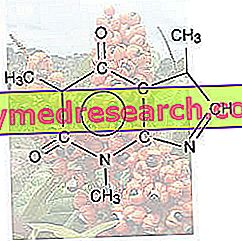Generality
Apple cider vinegar (in English Apple Cider Vinegar - ACV), otherwise known as cider vinegar, is a food vinegar made from cider or apple must.

Apple vinegar is widely used in condiments for raw vegetable salads, in marinades, in vinaigrettes, as a food preservative and in chutneys (condiments typical of South East Asia).
Production
Apple vinegar is made by fermenting crushed and squeezed apple juice. Yeasts are then added to the liquid to start the alcoholic fermentation process, so that the sugars can be transformed into alcohol.
In a second moment another fermentation process is started, for which the alcohol is converted into vinegar by acidifying bacteria (Genus Acetobacter ); in doing so, the apple vinegar acquires the right content of acetic acid and malic acid.
Apple vinegar has always been considered a health product and its fields of application (many of which are only theoretical, not to mention imaginative) are different: anti-flu, anti-wart, disinfectant of the oral cavity and skin (for topical use), digestive, strengthening of the immune system, stimulation of blood circulation, prevention of calculations, mucolytic (in vapors), mildly antitumor, etc.
How to take it?
Apple vinegar can be used as a food supplement, both in natural form, enjoying its probiotic characteristics, and in a dehydrated form.
Natural apple vinegar should not be drunk directly; it is so acidic that it could damage tooth enamel and, more rarely, the esophagus. It is also essential not to use too much. It is advisable to dilute 1-2 tablespoons in a glass of water to sip at meals once or twice a day.
Various apple vinegar based supplements are available on the market; most are in capsules, tablets and soluble powders. However, there is no regulation that establishes the minimum or maximum level of these products, which is why there is considerable heterogeneity between the products; also for this reason, it is recommended to strictly follow the indications mentioned on the label.
Does it Lose Weight?
Do Apple Vinegar Supplements Make You Lose Weight?
Apple vinegar (as well as many other types of vinegar and acidic foods) has long been proposed as a slimming product. However, it is not clear if the hypothetically responsible mechanism of this property could be of a chemical, metabolic or nervous nature.
The researchers suggest that apple vinegar may activate some genes involved in fat breakdown. The effect is probably very mild, as the dietician "Debbie Davis, RD" of Chicago says:
"Apple vinegar could give some advantages in terms of management and weight loss, but it is definitely not a quick and independent solution from the overall diet".
It is also presumable that apple vinegar is able to prolong the sense of satiety thus limiting food intake, with an effect of reducing the total energy intake.
The only study that tried to identify any slimming effects of apple vinegar was done in Japan. In the experimental, 175 obese and healthy people were divided into two groups; one took apple vinegar, the other water every day for 12 weeks. The diets were similar and they all compiled a food diary. At the end of the study, those who used vinegar lost slightly more weight than those who only consumed water. On average, the group that consumed apple vinegar lost 450-900g in the 3 months of experimentation; however, the object of the weight loss was restored almost immediately after the interruption, which suggests that a placebo effect could have occurred during the experiment.
Lower blood sugar?
Do Apple Vinegar Supplements Lower Blood Sugar?
Apple vinegar contains chromium, which can alter insulin levels in the blood. For this reason, it is recommended that people with type 1 diabetes mellitus consult their doctor before making a meaningful and systematic use of apple cider vinegar in their diet. On the other hand, the effect is desirable in those suffering from hyperglycemia or type 2 diabetes mellitus.
Carol Johnston, PhD, director of the Arizona State University nutrition program, has been studying apple vinegar for more than 10 years and believes that its effects on blood sugar can be very similar to those of some drugs. "The anti-glycemic effect of apple vinegar (from cider) is very well documented, " says Johnston, and explains that this product is able to hinder certain steps in starch digestion. "It does not block the absorption of 100% starch, but significantly reduces its entry into the blood by moderating the blood sugar level". Finally, Johnston points out that “In the case of a cure for diabetes, you should never stop taking your medication to replace it with apple vinegar. Anyone who wants to use it to lower blood glucose levels should first consult their doctor ”.
However, not all nutrition experts are convinced of this property.
"Trying to cure diabetes with apple vinegar is like trying to empty a flooded cellar with a teaspoon, " explains Michael Dansinger, MD, director of the "Diabetes Lifestyle Coaching" program at Tufts University. Furthermore, he says: "Patients are advised to focus on their overall diets, as this is a strategy supported by much more research."
Apple Vinegar and Digestion
According to Carol Johnston (see above), drinking apple cider vinegar in a starchy meal prevents digestion and absorption in the small intestine. In doing so, carbohydrates reach the large intestine and nourish the bacterial flora by acting as prebiotic agents.
Debbie Davis (see above) recommends using unfiltered apple vinegar, "the type of turbid vinegar, where you can see a kind of blob in the bottle". That species of "alga" is known as "the mother" and is saturated with probiotic agents. "Thanks to the presence of probiotics, this type of vinegar is able to support the immune function and, for some people, also to help counteract constipation, " says Davis.
Contraindications
Apple vinegar, although more delicate than wine, is considered a very acid food. The case of a woman who complained of severe burns from esophageal irritation, later confirmed by hospital diagnosis, was documented following the intake of an apple vinegar capsule.
Gastroparesis, a problem often determined by autonomic neuropathy, in turn commonly associated with type 1 and type 2 diabetes mellitus, consists in the pathological slowing of gastric emptying. In this case, taking apple cider vinegar can be anything but healthy. In fact, some research has shown that the food in question is able to significantly worsen the gastroparesis.
According to Michael Dansinger (see above), it is also necessary to keep in mind that acetic acid and malic acid, typical of apple vinegar, tend to lower the pH of the blood resulting in a decompensation that could affect both kidney function, both on the bone tissue of already compromised people.



